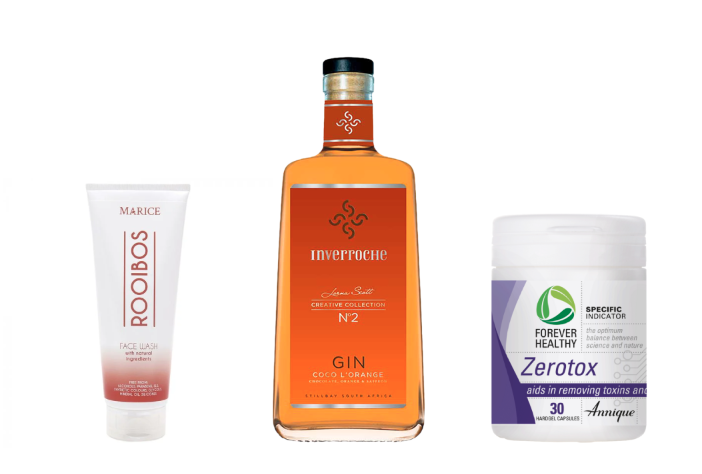The growth of rooibos in the beverage and wellness sectors has been fuelled by ongoing interest in the beneficial compounds found in the plant. Recent scientific studies have bolstered the claims of rooibos having unique health-giving properties made over many years by a variety of traditional practitioners and industry experts. And this marks something of the opening up of new frontiers for the rooibos plant, because from the pre-colonial era until the 1960’s, rooibos was mainly used as a tea beverage which had the dual appeal of being a healthy drink and being cheaper than black tea from Asia.
“While Rooibos tea is first and foremost a beverage, South African consumers and their physicians regard it as not only harmless – even to infants, and cardiac and kidney patients – but beneficial to the system, improving the appetite, calming digestive disorders, reducing nervous tension and promoting sound sleep.” (Morton, 1983).
Rooibos in Cosmetics: The Start of A Wellness Journey
As a traditional folk remedy whose use is hundreds of years old, rooibos is still used today to treat asthma, colic, eczema, headache, nausea, mild depression, anxiety, irritability and insomnia. It is generally regarded as a healthier alternative to caffeine-containing beverages (Joubert et al, 2008).
More recently, among the very first notable applications of rooibos beyond being used as a healthy tea was its inclusion in cosmetics. And this was in 1968 when Mrs Annetjie Theron, a South African mother struggling with an allergic infant, cast the spotlight on rooibos with her claims that it soothed away her baby’s colic.

She published a book on her findings called “Allergies: an amazing discovery” and went on to launch a full range of health and skin care products with rooibos as the basic ingredient, exporting this range around the world (Erickson, 2003; Joubert and Schulz, 2006). The ‘Annique’ range of cosmetics continues to this day, and has enjoyed success since its inception in 1971.
When investigating the potential actions of rooibos on the body, Snyckers and Salemi (1974) attributed the anti-allergic effect of rooibos when administered to babies to the antispasmodic properties of quercetin and luteolin that would have a calming effect on the stomach.
Rooibos and Wellness: Doing Well By Doing Good
When it comes to the category of wellness products that continue to expand in volume and variety, rooibos sits front and centre as a new area of considerable growth. Starting with the early days of Annetjie Theron’s development of the Annique range of cosmetics, rooibos’s penetration of this market space has grown to the extent that its utilisation in health products in general has seen explosive growth.
Rooibos tea leaves, stems and dust are processed into various rooibos extracts which are then used as the raw ingredient in the many formulations used in beverages, creams, sprays, soaps, shower and bath body washes and more.
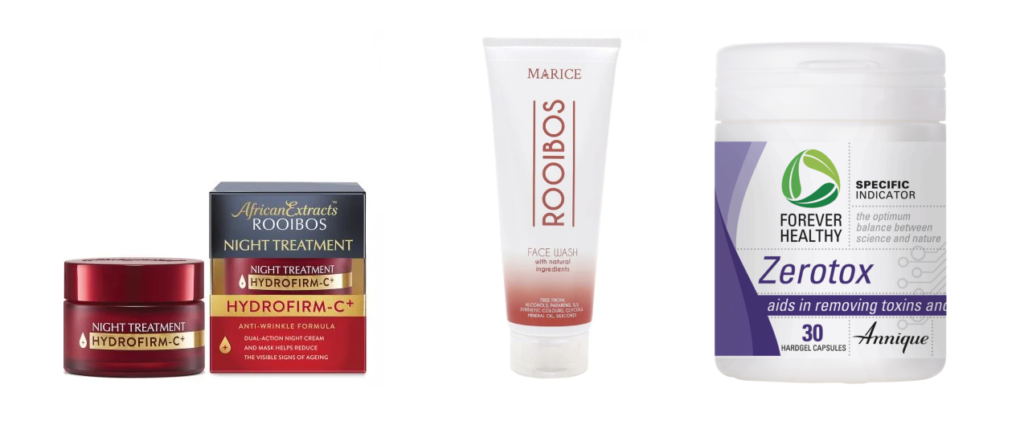
In creating the extracts and fine granulates sought out by wellness product brands for dermal abrasion properties, it’s the rooibos powder that is used. These additions to cosmetic formulations are completely natural and biodegradable – unlike polymer-based ‘microbeads’ that are well documented as being persistent in the environment and damaging to aquatic life.
Here at Klipopmekaar, we supply a range of clients with this raw material – and we’re encouraged by the increased recognition of the health-giving properties of the plant by the wellness ector.
Rooibos in Food and Beverages: Tasty and Healthy
While rooibos is increasingly included in wellness products, its huge potential as a phytopharmaceutical has not been fully exploited (Joubert & De Beer, 2011). Rooibos is however increasingly being included in a wider range of products like processed food, and confections – not least of which is the exploration of its use in fine chocolate.
Swiss master chocolatier, Daniel Waldis, founder and owner of SA’s popular chocolate franchise, Le Chocolatier recently said: “Globally, more chocolatiers are starting to use rooibos in chocolate bars, drinking chocolate and in sugar-free and vegan chocolate alternatives. Similarly, master tea blenders are infusing chocolate chips with rooibos which provides a luxurious mouthfeel.”
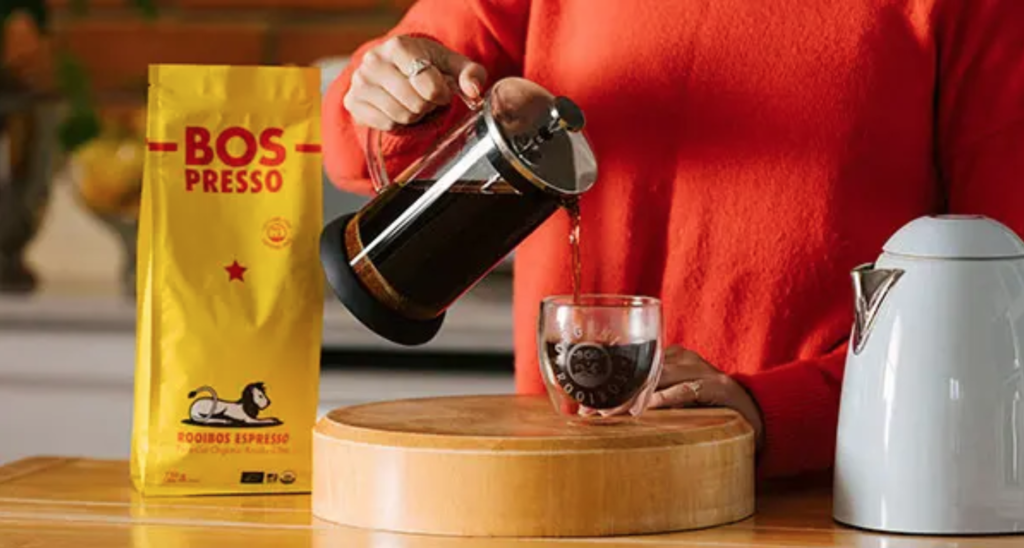
Beyond its use in luxury chocolate, rooibos is also seeing significant increase as an ingredient in a wide range of beverages, not least of which is ice tea. A good example of this is the rooibos farmed at Klipopmekaar, which constitutes the primary ingredient of the BOS Ice Tea range of beverages. As part of their development of innovative new ways to make use of rooibos, BOS recently released a new product to market: a rooibos-only form of espresso.
Named BOSpresso, this new entrant to the beverage market has generated a very positive response (and like all BOS products, only contains premium organic rooibos sourced directly from us at Klipopmekaar).
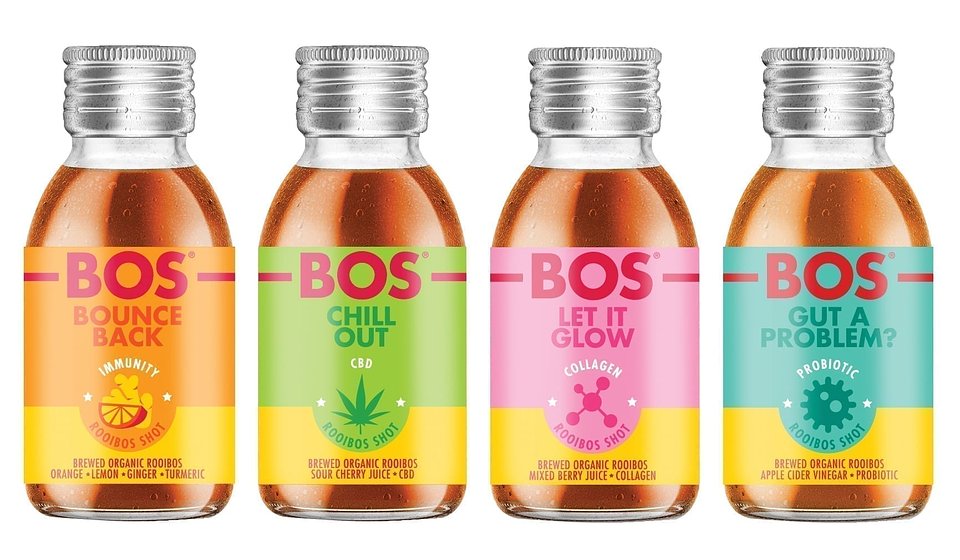
In keeping with the company’s innovations, BOS also recently introduced a range of functional rooibos-based health shots named BOS Shots.
The range is a welcome addition at a time of strong focus on health and self-care during the COVID-19 crisis, and the company has already seen its Bounce Back immune booster shot attract a lot of attention. Among its many health benefits, rooibos increases the levels of anti-inflammatory cytokines (compounds that fight inflammation) and reduces the levels of pro-inflammatory cytokines (compounds that promotes inflammation). The Bounce Back shot contains brewed organic rooibos, orange juice, lemon juice, ginger extract, turmeric extract, and ascorbic acid (vitamin C). This powerful combination of ingredients with antioxidants and anti-inflammatory properties, helps to defend the body against viruses and bacteria. Other shots in the range are Chill Out (CBD), Let it Glow (collagen) and Gut A Problem? (probiotics).
A Drop of Red? Rooibos Takes Flight Into Alcoholic Beverages
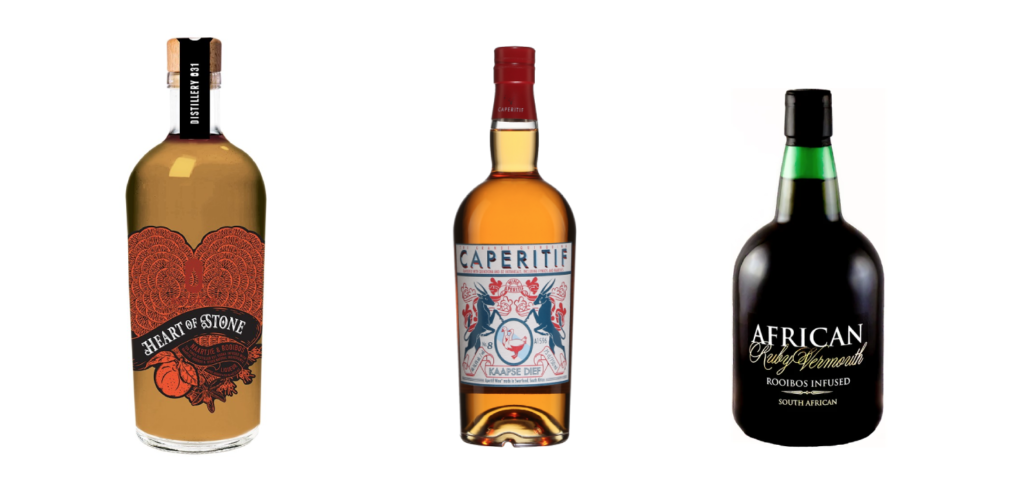
Rooibos, due its sweetness, and intrinsic ability to ‘carry’ other sweet ingredients has made it a desirable component for natural FMCG product developers. Due to this compatibility, beverage brands have for a long time mixed it into both alcoholic and non-alcoholic beverages.
Now widely used as an ingredient in cocktails (and mocktails), it’s a popular botanical element to include in gin-based, vodka-based or brandy-based cocktails, alongside supporting ingredients and garnishes such as cloves, cinnamon, mint, lime, fruit, honey and lemon. As this use has progressed, so another area of swift uptake has been that of its inclusion as a primary ingredient in alcoholic beverages, this being in line with the increase in botanical extracts and raw ingredients in an ever-widening number of wines, gins, liqueurs, vermouths and even craft beers.
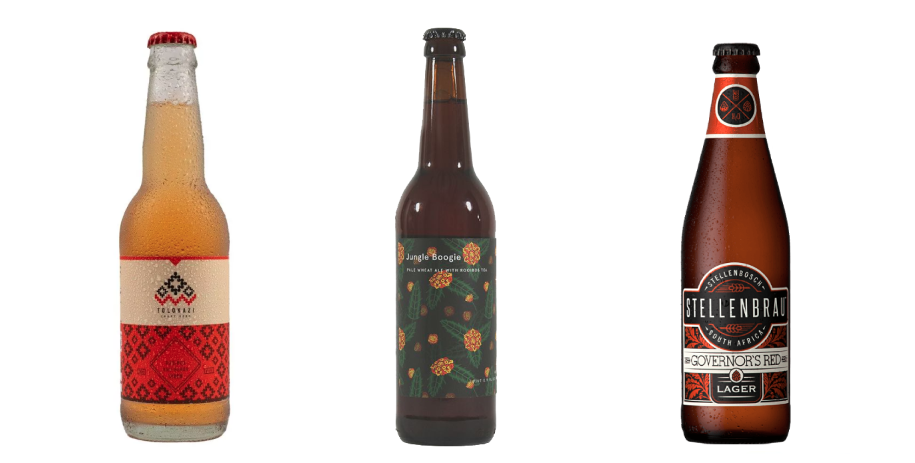
In particular, the range of brands and products in the rooibos gin category has rapidly expanded, on the back of massive growth of the craft gin sector in South Africa in general – and in Cape Town specifically.
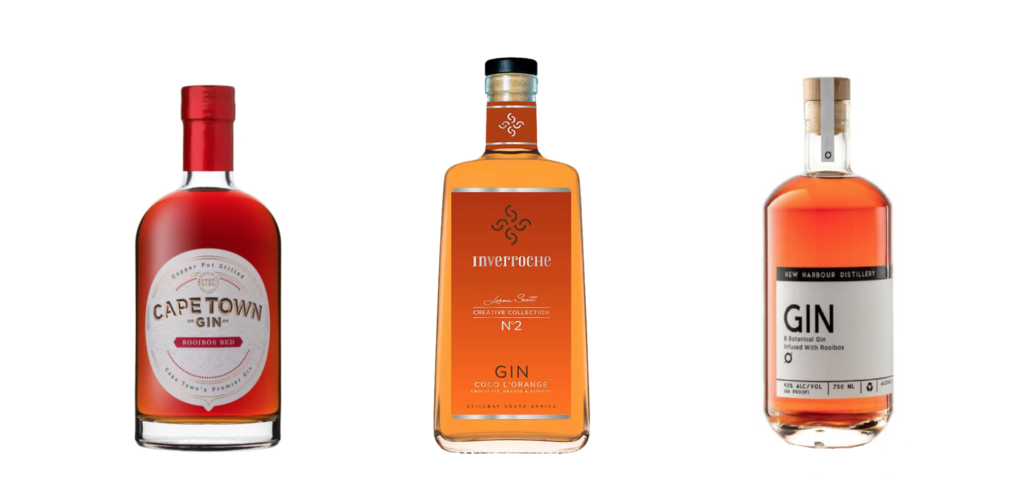
Of course, it comes as no surprise that gin brands looking for local floral and botanical components to use in the distilling of their gins would seek rooibos out. Rooibos, and a number of other Cape Floral Kingdom plants, provide an excellent bouquet that combine to create a symphony of flavour notes.
Rooibos in Wine: Goodness in Every Glass
Of note in this area is the groundbreaking work done by Audacia Wines, who in 2014 brought a revolutionary new product to the wine market: a sulphite-free Pinotage that made use of the antioxidant properties of rooibos in order to completely eliminate the need for sulphites as a preservative.
The wine has gone on to garner rave reviews – and Audacia’s patented rooibos preservation technique has proved robust enough for new varietals of wine to be launched, with these innovative winemakers adding a Merlot, Shiraz and Chenin Blanc to their range.

As the versatility of rooibos, and research into the health-giving properties of the plant confirm ever-greater ways in which it can and does have beneficial effects for our bodies, so these new frontiers continue to open up.
For us here at Klipopmekaar, we’re thrilled to see rooibos gaining global recognition as a healthy and natural addition to the diet and lifestyle of increasing numbers of people the world over – and we continue to keep our eye on the many ways in which it is finding new uses. Being tannin- and caffeine-free, rooibos is increasingly recognised by a growing body of studies as possessing antioxidant and anti-inflammatory compounds.
If your business is one that is considering sourcing premium organic rooibos in bulk in order to expand its product range and bring this wonder plant’s impressive properties to your target market, you’re welcome to get in touch with our team. We produce a range of rooibos products that are among the world’s finest, with each carrying a wide range of global certifications, and we would be happy to discuss how our rooibos could enable your business to take its next steps into this exciting territory.

